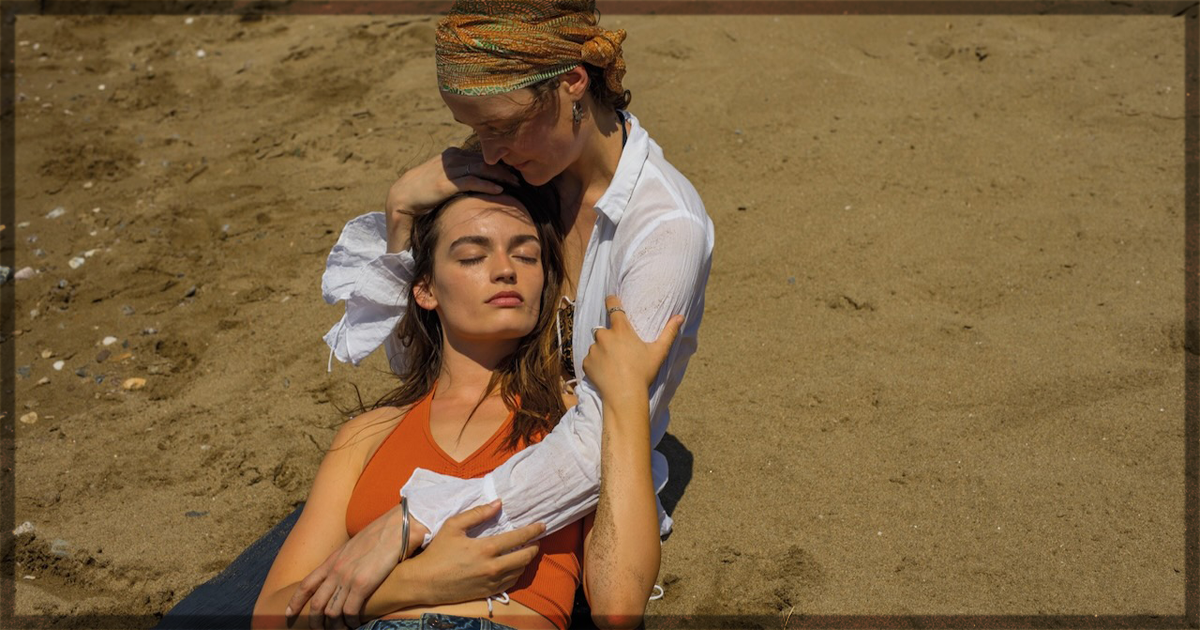Rebecca Lenkiewicz will always be in the British history books as the first living female writer to have a play produced by The National Theatre. Her Naked Skin, staged in 2008, was about the violence involved as British women fought for the right to vote; my main memory is of the sequence where a suffragist is force fed. Ms. Lenkiewicz told the BFI Flare audience that she only agreed to adapt the script of Hot Milk, from the novel by Deborah Levy, if she was also allowed to direct. It’s understandable she was given the chance; its focus on women striving for better things against appalling odds is her wheelhouse. However she clearly was so inside the text that things which made perfect sense to her did not quite work on screen. That makes Hot Milk an interesting watch instead of a good one.
Sofia (Emma Mackey) is in her early twenties and has been her mother’s carer for most of her life, apparently without resentment. This is somewhat unbelievable to anyone who has ever asked a teenager to load the dishwasher, but never mind. Her mother Rose (a wonderful Fiona Shaw) has mortgaged their house in London to bring them to a small beach town in Spain, near a clinic run by Gomez (Vincent Perez, very good in his too-brief scenes) who has promised to help with the ailments that make it difficult for her to stand. However Gomez pointedly corrects Rose when she refers to him as a doctor, and his main staff member appears to be his daughter Julieta (Patsy Ferran). Rose and Sofia have rented a cheap little house, with the landlord’s barking dog chained on the roof, which offers no concessions to Rose’s wheelchair. While they generally get on well together, with a friendly intimacy and constant chat, the routines of caring for Rose’s body are not shown at all. Considering this is a movie based on disability, and Rose has strong opinions about how everybody generally and Sofia specifically should be living their lives, this is a curious elision.
Instead the movie mostly follows Sofia as she wanders around the beaches, away from her responsibilities, sunbathing or maybe reading a book. This respite eventually seems to include a sexual awakening, with German seamstress Ingrid (Vicky Krieps, who has never made a boring choice in her career). But Ingrid – who is introduced on horseback on a beach – is clearly damaged too, to the point where most of the movie makes it seem like she is a fantasy of Sofia’s. It’s hard to tell whether the ambiguity is deliberate, but as the plot turns on Sofia’s mental health starting to unravel as Rose’s physical health improves, it’s sloppy work not to make this explicit.
But this ambiguity is meant to be the point. Sofia’s Greek father (Paris Thomopoulos), who walked out on them when Rose developed her health problems, is described as a wealthy man who could have helped them over the years but chose not to. And yet he is a sad, weary, slumped man, clearly with no financial means whatsoever and who seems incapable of making toast for a child’s breakfast, much less nurse a sick wife for decades. What are we meant to believe? Is Gomez a quack or is he really able to help Rose get better? Is Julieta really his daughter? And if this is not the life Sofia wants for herself, then what can she do about it?
Ms. Mackey has a very difficult part to play here, and needed a more experienced director to help her achieve a more appropriate tone. If Sofia is bitter, her romance with Ingrid will be a problem instead of an escape. If she is defeated, the romance won’t help. If she is content with her lot, the romance isn’t necessary. And if she is obviously mentally ill, the question of whether the romance is there at all would become too loud to ignore. Instead what carries the movie is firstly Ms. Shaw’s robust performance as a woman who has been knocked down, but who absolutely refuses to stay down, and will get her will by hook or by crook. But mainly the compulsion to stay with Hot Milk belongs to the work Ms. Krieps has done. Whether she is playing a real person or a figment of the imagination, she brings a specificity and a cockeyed vivacity to her work, lending a gentle unpredictability to the way she takes off a hat or puts down her sewing. But it’s clear this has been done in spite of the direction, not because of it. Cinematographer Christopher Blauvelt, who has worked regularly with Kelly Reichardt and whose most recent movie was the very different May December, uses the Spanish sunlight as an antiseptic, to flush all the family secrets into the light.
But unfortunately Hot Milk doesn’t hang together. It has no certain tone, and it doesn’t seem to know what it’s about until the very final sequence, meaning the work of those excellent actresses builds to nothing. It’s a shame that Ms. Lenkiewicz’s skill as a director doesn’t match her skill as a writer, but the performances within this most interesting misfire make it worth seeing once.
Hot Milk recently screened at BFI Flare.
Learn more about the film at the IMDB page for the title.


